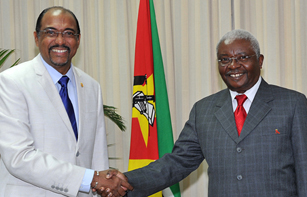
Feature Story
Progress in Mozambique's HIV response, but more focus needed on HIV prevention
05 September 2011
05 September 2011 05 September 2011
UNAIDS Executive Director Michel Sidibé (pictured left) with President Armando Emilio Guebuza of Mozambique.
In a meeting with Armando Emilio Guebuza, President of Mozambique, UNAIDS Executive Director Michel Sidibé commended the Government of Mozambique on progress in the national response to HIV, which has resulted in a reduction in new HIV infections and expanded access to antiretroviral treatment.
According to the latest estimates from UNAIDS, the rate of new HIV infections in Mozambique fell by more than 25% between 2001 and 2009. More than 200 000 people living with HIV in Mozambique were receiving life-saving treatment, care and support services at the end of 2010, according to government estimates.
“Commendable coordination between the Government of Mozambique, development partners and civil society has led to the scaling up of programmes for HIV prevention, treatment and care on the ground,” said the UNAIDS Executive Director.
Despite progress, Mozambique continues to have the second highest rate of new HIV infections in the world. In his meeting with the President, Mr Sidibé stressed the need for multi-faceted HIV prevention programmes based on local knowledge of the epidemic. Such programmes would require political commitment and leadership at the highest levels, he said.
In recent years, the Government of Mozambique has made improvements in the country’s primary health care system to meet the growing demand for HIV treatment, care and services. However, bottlenecks continue to hamper the AIDS response, including weak financial and supply management systems and an inadequate health workforce. Mr Sidibé called on President Guebuza and his Government to strengthen the national health care system and increase domestic resources for the HIV response.
Commendable coordination between the Government of Mozambique, development partners and civil society has led to the scaling up of programmes for HIV prevention, treatment and care on the ground
UNAIDS Executive Director Michel Sidibé
During the meeting, the UNAIDS Executive Director briefed the President on the launch of “Give AIDS the Red Card”—a campaign that uses the universal appeal of sports for advocacy around the UNAIDS vision of Zero new HIV infections, Zero discrimination, and Zero AIDS-related deaths. Mr Sidibé presented the President with a pledge of support for the “Red card” campaign signed by the heads of delegations from 47 countries participating in the 10th All-Africa Games in Mozambique.
Mr Sidibé informed the President of the planned appointment of up to 12 athletes as African Goodwill Ambassadors for the “Red Card” campaign across the continent. He urged the President to secure additional support for the “Red card” campaign from other world leaders at a UN General Assembly meeting in September 2011 and at the next African Union Commission Summit in Addis Ababa.
The meeting with the President Guebuza concluded Mr Sidibé's four-day official visit to Mozambique. While in Mozambique, the UNAIDS Executive Director also met the Prime Minister, other government officials, development partners and civil society groups to exchange views on opportunities and challenges in the national AIDS response.
A central concern raised by government officials and partners during the visit was the risk of stock-outs of antiretroviral drugs. “Drug stock-outs could potentially reverse the gains in Mozambique’s HIV treatment programme,” said Mr Sidibé. “Urgent steps must be taken to manage the risk of drug stock outs,” he added.
Related
 “Who will protect our young people?”
“Who will protect our young people?”

02 June 2025
 Impact of US funding cuts on HIV programmes in Uganda
Impact of US funding cuts on HIV programmes in Uganda

19 March 2025

